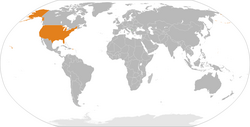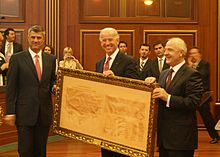Kosovo–United States relations
 | |
Kosovo |
United States |
|---|---|
| Diplomatic mission | |
| Embassy of Kosovo, Washington, D.C. | Embassy of the United States, Pristina |
| Envoy | |
| Ambassador Ilir Dugolli | Ambassador Jeff Hovenier |
History

The US established full diplomatic relations at Ambassador level with the Republic of Kosovo.[3] Kosovo considers the United States its greatest partner in gaining recognition from the rest of the world, and such view is also expressed from United States Officials.[4]
The United States and Kosovo established diplomatic relations on February 18, 2008. U.S. President George W. Bush on February 19, 2008 stated that recognizing Kosovo as an independent nation would "bring peace to a region scarred by war".[5] The bilateral ties the United States shares with Kosovo are maintained through the U.S. Embassy in Pristina, which was opened on April 8, 2008 by then-Chargé d'Affaires ad interim Tina Kaidanow. Prior to the declaration of independence, the United States maintained U.S. Office Pristina (USOP), with a chief of mission. The US also continues to contribute troops to the Kosovo Force (KFOR), and will be providing staff to the ICO and EULEX missions.
During the European Commission-hosted international Donors' Conference on July 11, 2008 the United States pledged $400 million for 2008–2009 to support, among many other things, helping relieve debt Kosovo may inherit. U.S. assistance in Kosovo continues to support governance through strengthening civil society and political processes, especially targeting minority communities, and aims to strengthen economic institutions and help private enterprise grow.
In May 2009, then Vice President Biden visited Kosovo and was greeted by large crowds.[6] He affirmed the US position that Kosovan "independence is irreversible".[6] The Obama administration remained committed to Kosovo.[7] In August 2016, Vice President Joe Biden, visited Kosovo and attended a ceremony that renamed a southeastern highway "Joseph R. 'Beau' Biden, III" to honour his son Beau's contribution to Kosovo for training its judges and prosecutors.[2][8][9] The US has a large military base in Kosovo named Camp Bondsteel, and it forms part of its defence strategy for the region.[7]
Kosovo has named certain places in Pristina after U.S. leaders such as Bill Clinton Boulevard and George W. Bush Street.[10][11][2][7] Around Pristina, other streets are named after former military commanders involved in the NATO campaign, honouring their role to conflict between local Albanians and the Yugoslav army.[2] The capital also has a women's clothing shop named Hillary, after Hillary Clinton and atop on some large buildings and hotels architectural features replicating US monuments and symbols like the Statue of Liberty or the bald eagle.[2] In Kosovo, Bill Clinton is considered an iconic figure and hero.[7][2] Many US flags are flown throughout Kosovo from buildings.[7] The US donated funds and built one of the largest film studios in Europe, located in the suburbs of Pristina.[12]
Widespread sentiments of gratitude are held by people in Kosovo to the US for playing a major role in ending Serb control of the area.[7][8] These sentiments increased, including support toward the US, especially after it recognised Kosovan independence.[7] The Kosovo population also support the US engagement with the Balkans, which is viewed as anti-Serbian.[7] After the Kosovo War, the US remains popular among the Kosovo Albanian population.[7] According to the 2012 U.S. Global Leadership Report, 87% of Kosovars approve of U.S. leadership, the highest rating for any survey in Europe.[13] According to a 2016 report by Gallup, Kosovo led the region and the world again in approval for the second consecutive year, with 85% approving of U.S. leadership.[14] According to a recent report by Gallup of U.S. Leadership on Trump's term, Kosovo led the region and the world again in approving of U.S leadership with 75% approval.[15]
-
Kosovo Albanians with US flags and banners, 2009
-
Bill Clinton statue in Pristina
-
Joe Biden on a tour of the Visoki Dečani in 2009
-
Kosovo PresidentHashim Thaci (left) with US Secretary of State Mike Pompeo(right) in 2020
-
Medlin Olbrajt Square in Prishtinë, Kosovo named in honor of Madeleine Albright
US-mediated Kosovo–Serbia negotiations

On October 4, 2019, U.S. President Donald Trump appointed Richard Grenell as the Special Presidential Envoy for Serbia and Kosovo Peace Negotiations.[16] After months of diplomatic talks, on January 20, 2020, Serbia and Kosovo agreed to restore flights between Belgrade and Pristina for the first time in over 20 years.[17][18]
On September 4, 2020, the
The United States, along with other western countries like France, Germany, Italy and the United Kingdom have engaged with the governments of Kosovo and Serbia to find a practical solution which would allow eligible citizens of Kosovo to exercise their right to participate in Serbia’s 2022 elections.[22]
U.S. embassy
The sixth and current
Kosovo embassy
Ilir Dugolli is the current ambassador from Kosovo to the U.S. The
See also
- Kosovan emigrants to the United States
- Serbia–United States relations
- List of ambassadors of Kosovo to the United States
- United States–Yugoslavia relations
References
- ^ "U.S. recognizes independent Kosovo". Archived from the original on 2008-10-16. Retrieved 2008-02-18.
- ^ a b c d e f Bezhan, Frud (17 August 2016). "Word On The Street Is That Kosovo Has A Love Affair With Americans". Radio Free Europe / Radio Liberty. Retrieved 24 October 2020.
- ^ "US Embassy Pristina". Retrieved 2008-04-17.
- ^ "Kosovars fume at new delay in accessing EU visa-free travel". AP NEWS. 28 June 2022.
- ^ U.S., Britain, France back Kosovo
- ^ a b Chun 2011, pp. 91, 94.
- ^ a b c d e f g h i Chun, Kwang-Ho (2011). "Kosovo: A New European Nation-State?" (PDF). Journal of International and Area Studies. 18 (1): 94.
- ^ a b Bytyci, Fatos (15 August 2016). "'We owe you so much,' Kosovo to tell Biden as street named after late son". Reuters. Retrieved 24 October 2020.
- ^ Rucker, Philip; Viser, Matt; DeBonis, Mike (6 March 2020). "Trump and allies resume attacks on Biden's son as the Democrat surges". The Washington Post. Retrieved 24 October 2020.
- ^ "Albanian Street Named After George W. Bush". Balkan Insight. 8 June 2007. Retrieved 22 August 2023.
- ^ Plesch, Valerie (1 March 2016). "Kosovo shops celebrate Hillary Clinton and her style". Al Jazeera. Retrieved 22 August 2023.
- ^ Mitrović-Marić, Jasmina (2009). "Mladi i Kosovo". Danica. Vuk's Foundation. Vuk: 173–177.
- Gallup
- Gallup
- ^ Zivanovic, Maja (18 January 2018). "Kosovo Leads World in Cheering for Trump, Poll Shows". Balkan Insight. Retrieved 21 August 2023.
- ^ Bayer, Lili (4 October 2019). "Trump names Ric Grenell his special envoy for Serbia and Kosovo". Politico. Retrieved September 4, 2020.
- ^ "Serbia-Kosovo Flights to Resume Under U.S.-Brokered Deal". The New York Times. 2020-01-20.
- ^ "Kosovo-Serbia flights to restart after two decades". Euronews. 2020-01-25.
- ^ Riechmann, Deb (4 September 2020). "Serbia, Kosovo normalize economic ties, gesture to Israel". Associated Press. Retrieved 4 September 2020.
- ^ "Documents signed at the White House cover wider scope than expected". European Western Balkans. September 4, 2020. Retrieved September 5, 2020.
- ^ Gearan, Anne (September 4, 2020). "Serbia and Kosovo sign breakthrough economic accord that is short of normal relations". The Washington Post. Retrieved September 4, 2020.
- ^ "Joint Statement on Kosovo". United States Department of State.
- ^ "Новый посол США в Косово приступил к исполнению полномочий".






